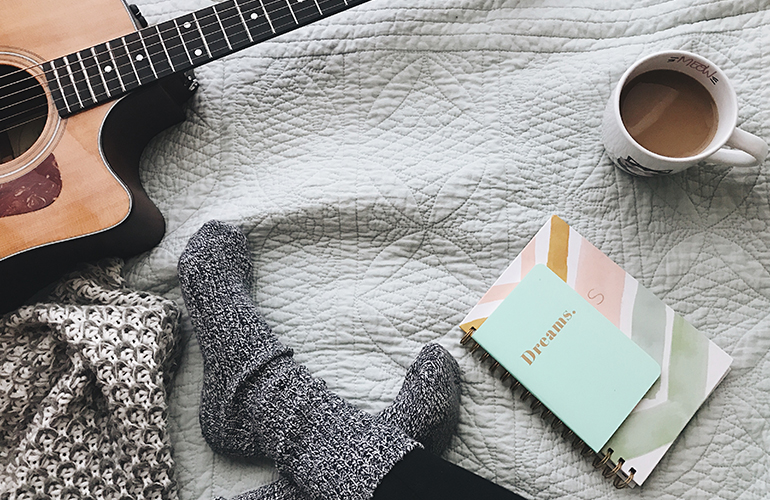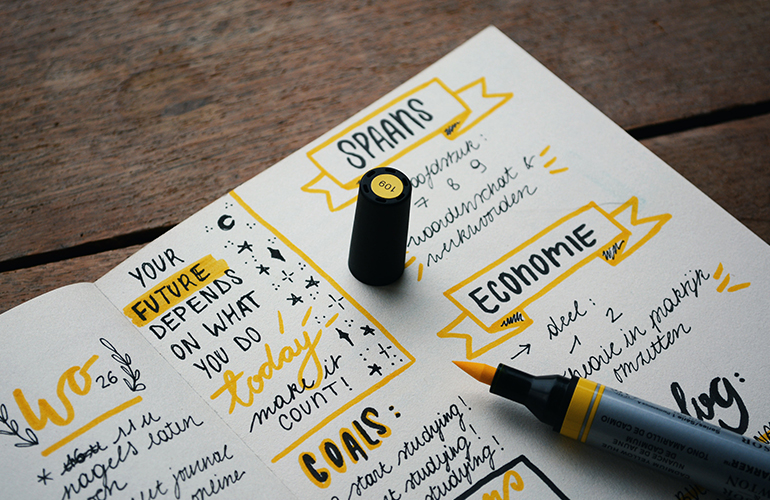Journaling isn’t just for teenagers. As Arlo Laibowitz explains, jotting down your thoughts, plans and reflections can help you with self-development. Check out these six creative journaling ideas and discover the many benefits these techniques will bring to your life.
Many of us have started writing a diary or journal at some points in our lives. And many of us have also stopped writing in them not that much later! Indeed, many famous artists, writers, entrepreneurs, inventors, and thinkers keep – or have kept – journals, and there are many different journaling ideas and techniques you can try. For many, it's a creative necessity and outlet. For some, it's a place for exploration, and yet for others, journaling is an art form in itself.
In fact, journaling can be enriching and fulfilling on many levels. It can lead to insights, personal growth, and setting and achieving goals. Journals record our ideas, thoughts, feelings and reflections. In doing so, they create a through-line in our life, a place of refuge and reflection, that we can visit and revisit.

Dream diaries: keep track of your dreams... or maybe your ambitions?
Personally, I started journaling years ago, as part of the Morning Papers practice of The Artist’s Way. I've written notebooks full of journal entries related to personal growth, gratitude, creative development, project ideas, personal insecurities, blocked traumas, to-do-lists, goals, dreams and much more.
Indeed, I've tried types of journaling for weeks or months at a time – and have also not journaled for weeks in between entries! Every time I come back to the practice and sustain it on a regular basis, I feel I can go deeper; explore things more explicitly, and in the process, experience a wonderful journey to my interior.
“There are many types of journaling. For many, it's a creative necessity and outlet. For others, it's an art form in itself.”
So, what are the benefits of journaling? What different journaling ideas and techniques can we employ? And how do we go about starting and – more importantly – sustaining a journaling habit?
What are the benefits of journaling?
Furthermore, the benefits of journaling are emotional, cognitive, creative, and possibly even spiritual. Creative journaling helps us to:
- Know ourselves better, by clarifying our thoughts and feelings.
- Release thoughts and emotions, by recognizing and tracking them.
- Increase focus, deepen our learning and problem solving.
- Boost stability and help us let go of the past.
- Resolve disagreements with others, by detaching ourselves from the conflict and reflecting on it.
Furthermore, studies show that specifically keeping a gratitude journal offers some added benefits. People that keep a gratitude journal are happier, healthier, more balanced, and generally more optimistic. What's more, they are less self-centered, less susceptible to feelings of envy, more relaxed and better in decision-making.
Journaling ideas: 6 techniques to try
There are many different types of journaling you can benefit from. Here are six creative journaling ideas to get you started. You can always try more than one at a time and discover what suits you best.
1. Ten minute routine
An easy technique to start journaling is practising the Ten minute routine. Before going to bed, ask yourself so-called “requests” – the things that you're trying to accomplish – and write them down. Then, in the morning, write down your answers and thoughts on these questions. This way of journaling is especially efficient to review and sharpen your to-do-list and life vision, as they become forged in your subconscious mind.
2. Stream of consciousness
Another tried way creative journaling idea is writing every day in a stream of consciousness. Write down any thought, memory, to-do-list, feeling, drawing, or whatever else pops up. Just let it flow as you write, without trying to censor or edit yourself. Keep going until everything in your 'stream of consciousness' is on the page.
3. Morning memories
Another different journaling technique is writing 'morning memories'. Schedule your journaling session each morning, before you start your day. Use the same journal every day, sit in the same spot, and when you’re done writing, take time to reflect on what you've written and accomplished in that session.RELATED: Morning Meditation: The Secret To A Great Day
4. Gratitude journaling
Probably the most researched journaling technique is the gratitude journal, as mentioned earlier. For maximum benefit, take 15 minutes per day, three to four times a week, to journal about what you're grateful for on that day. Be specific, choose depth of gratitude instead of breadth, and try to get personal (being thankful to people is more efficient than to things). Make a note of seeing good things as a gift, as well as savouring surprises and unexpected events.
 Journaling techniques: start putting pen to paper
Journaling techniques: start putting pen to paper
5. Intensive journal
A comprehensive method of journaling is using the intensive journal process. This copyrighted process, which can be learned in specialised workshops, enables the person journaling to get to know themselves on profound levels.
“People that keep a gratitude journal are happier, healthier, more balanced, and generally more optimistic.”
The Intensive Journal Workbook is a large notebook filled with paper and divided into four dimensions of human experience: Life/Time, Dialogue, Depth and Meaning. Each of these aspects is divided into several subsections to work through in the path that the method prescribes. Some of these paragraphs are used to write about our memory of the events of our lives as well as dreams and images. Others are more geared towards stimulating insights and creative activity.
6. Enso drawing
There are various forms of journaling. We can choose a traditional way, with pen and paper, or write in an electronic journal, use various media, or add art practices to our journaling (like drawings or collages, or even specialised forms like enso drawing).
How to start and sustain a journaling habit
- A straightforward way to start journaling is by starting every day with writing down tasks and goals that you have for that day.
- Only write a few items, to make it easy to start and make progress.
- It's useful to mix personal and professional things.
- By keeping each journal entry short in the beginning, it's easy to succeed.
- At the end of each day, look back at what you've accomplished, what you've learned, what you want to explore further, and what you want to pursue the next day.
Once you've developed a basic journaling practice, you can dig deeper and further expand it. Some commonly held beliefs and ‘best practices’ include:
- Start writing about where you are in your life at this moment, and build on that in subsequent journal entries.
- Start a dialogue with your inner child by writing in your non-dominant hand, and switching back to your dominant hand.
- For sustaining your gratitude practice, maintain a daily list of things you appreciate, including uplifting quotes.
- Start a journal of self-portraits; draw, write, or collage who you are today, and learn to appreciate and develop yourself.
- Keep a nature diary to connect with the natural world: record what you experience in looking at the sky experiences the weather or walks in nature.
- Maintain a log of successes, starting with big ones that you remember, and then add them as they occur.
- Keep a log or playlist of your favourite songs. Write about the moods and memories they trigger.
- If there’s something you're struggling with or an event that’s disturbing you, write about it in the third person to create distance and perspective.
Journal techniques: travels to our interior
Journaling is a powerful habit that enables us to get a more in-depth and clearer understanding of the thoughts, feelings and issues we're working through. Whether we use journaling to accompany our meditation, forgiveness, or gratitude practices, or to work through emotional trauma or creative stumble blocks, a daily practice enables us to focus and develop further. Trying different journaling techniques has given me many benefits in life. I wish you the same journey as you explore your journaling practice! ●
Images: Cathryn Laver, Ben White, Haley Powers, Estée Janssens on Unsplash
happiness.com | The fine art of being: learn, practise, share
Are you a happiness.com member yet? Sign up for free now to enjoy:
■ our happiness magazine with practical life tips
■ share and support in our happiness forum
■ self-develop with free online classes in our Academy
Written by Arlo Laibowitz
 Arlo is a filmmaker, artist, lecturer, and intermittent practitioner of metta meditation and morning yoga. When not dreaming about impossible projects and making them happen in the most impractical ways possible, he journals, listens to jazz, or cuddles with his better half.
Arlo is a filmmaker, artist, lecturer, and intermittent practitioner of metta meditation and morning yoga. When not dreaming about impossible projects and making them happen in the most impractical ways possible, he journals, listens to jazz, or cuddles with his better half.





Join the conversation
You are posting as a guest. If you have an account, sign in now to post with your account.